12 Music Reviews
Cars Can Be Blue, All the Stuff We Do (HHBTM)
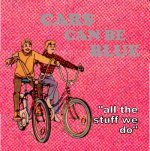
Can indie-pop and stand-up comedy live as one? That's the musical question posed by Cars Can Be Blue, a duo with improv-comedy roots who sing and play short, melodic pop songs with catchy tunes and jokes for lyrics. Does "Dating Batman" sound like a song title or a skit name on a comedy album? You tell me. How about "Perm Guy", or "Retarded Retard"? On All the Stuff We Do Cars Can Be Blue blur the line between kind of jokey pop songs, a la Tullycraft, and straight-up jokes masquerading as pop songs. That wouldn't be so bad if the humor didn't remind me of sitting through a dull opening-act comedian at an even duller comedy club. These jokes land with a thud, at least for me. Humor's subjective, but dirty-hippie jokes aren't my cup of tea. I don't think singing about a "retard" is inherently funny. I don't laugh when someone sings in a fake Southern accent. Sex jokes made by second-graders on the playground weren't that funny. And they aren't any funnier when you sing them. Do I find myself humming along to Cars Can Be Blue's songs from time to time? Certainly. They play pop fast and cute. Their music is harmless fun...well, not counting the "retard" jokes. - dave heaton
The Cat Box Quartet, Running Uphill (Radio Khartoum)
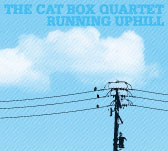
Take your pick: on Running Uphill the Cat Box Quartet sound like film-score composers who decided to burn the film and just compose to the pictures in their brains instead, or like improvising hermits, hiding in your electrical wires making music out of the air. That is, this is music for your imagination - atmospheric instrumental music full of amibuity. At the same time it's accessible, meaning melody is a key ingredient and the overall sound is blissful. Seven musicians are credited in the liner notes for this quartet, though the recording seems to be mostly the brainchild of Marc Kellaway, who's listed as playing "melodica, piano, spoon, water, beats, cooking, field recordings, sine waves, accordion, acoustic guitar". Running Uphill is adventurous, but gently, quietly so. It's pretty music that's also out to throw you for a loop, the best kind. - dave heaton
Catfish Haven, Please Come Back (Secretly Canadian)
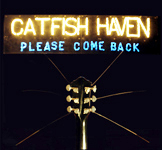
"We're Catfish Haven and this is what we do!", George Hunter breathlessly sings at the start of the trio's Please Come Back EP. What they do is write emotion-filled, countryish, bluesy, folksy pop songs and play them in a ramshackle, straight-from-the-gut manner, like we're all crowded together in a room somewhere and they're trying to rock us into joining the club. Played energetically like this, the songs pick up an extra level of power even when they're slow in pace, as they mostly are. There's an almost gospel-like fever-ish to the love song "You Can Have Me", though at its core the song is sweet and gentle. "Crying Shame" is a slow blues churner, but filled with yearning, accentuated when they drag the ending out and then pause on the final notes. Catfish Haven's songs themselves are moving and forceful, but they become especially so the way they're recorded here, with the band playing like someone's hot on their tail and they've only got a few more minutes left. - dave heaton
Imaginational Anthem: A Guitar Anthology (Near Mint
Records)
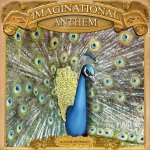
Imaginational Anthem is a nice compilation of acoustic guitar
fantasies from several different original, archival and licensed
sources--hmm, sounds like a record geek's wedding. Two versions of Max
Ochs's title track bookend the collection, first in a new version and
later his 1969 recording with its great, idiosyncratic slide-work (and,
yes, he is the cousin of Buckeye legend Phil Ochs). Sandy Bull and John
Fahey are naturally both represented as well, the latter with a really
nice, untitled and previously unreleased piece recorded in 1996, the
former with one of his unique arrangements of a Christmas carol ("O
Holy Night" this time). Some of the other names are familiar as well,
though not necessarily in this context; the fine jazz guitarist Bern
Nix, best known for his work with Ornette Coleman's Prime Time, adds a
nice solo composition (from a forthcoming release, no less, which I can
only hope they send me), while the legendary avant garde composer Terry
Riley even shows up to play some piano behind his son Gyan. Of the
younger artists, Kaki King is particularly impressive with her sublime
playing on "Night After Sidewalk." Enough to make you want to pick up
your acoustic guitar...and keep an eye out for more releases from Near Mint. - ted kane
Jazzanova, Blue Note Trip (Blue Note)
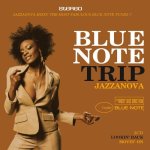
The cover for Jazzanova's Blue Trip shows a photo of a woman provactively opening her jacket while dangling her sunglases with the other hand, screams "lifestyle ad", like something that would appear in a fashion magazine. It stands in stark contrast to the classic covers of the old Blue Note albums which Jazzanova drew from for this 2-disc set, but who cares when the music itself is this good. DJing collective Jazzanova play the role of record collecting gurus here more than dance-club show-offs. They've mixed together 25 Blue Note cuts in total, and they've done so in a completely unobtrusive way. Of course they haven't left the recordings alone, but they've left them alone enough, so that you notice the original musicians' skills more than the hands of the DJs. Starting with Bobbi Humphrey's "You Make Me Feel So Good", the first disc Lookin' Back sets a mellow mood, for sure, but one filled with melody and groove - two elements present through the whole endeavor. As the disc proceeds, the variety of the Blue Note catalogue is most certainly evident, even as the general tilt is towards the soulful and melodic. The 1970s is the most prominent decade, but then there's a couple Afro-Cuban cuts from the '50s and before, including James Moody and His Bop Men's "Tin Tin Deo", which features typically outstanding drumwork by Art Blakey. Herbie Hancock's classic "Maiden Voyage" is here, along with great tracks from Freddie Hubbard, Horace Silver, and others. Disc 2, Movin' On has its own mood, slightly more laidback ("Sunday morning listening session" was their original intension), but is in the same general vein, from Bobby Hutcherson's gentle, graceful "Love Song" through to the closer, Bobbi Humphrey's wistful "Is This All?" - dave heaton
Kind of Like Spitting, Learn: The Songs of Phil Ochs (Hush Records)
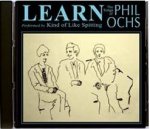
These days it might be in vogue to decry political music as too preachy or serious, and I've certainly heard my share of cringe-inducing protest songs. But when a songwriter is moved to raise his or her voice about injustice or inequality, and has the talent to form those passionate opinions into a memorable song, there's nothing more powerful. Phil Ochs is the ultimate example, a singer/songwriter who could channel anger but also hurt and sadness into songs that will stand the test of time. Kind of Like Spitting's Learn: The Songs of Phil Ochs mini-album is one more reminder of that, as Ben Barnett and David Jerkovich offer nine heartfelt covers of Phil Ochs songs. Critics of music that's "too political" often invoke the image of the stodgy, self-righteous preacher figure, but the urge to speak out so often comes from real, hard-felt pain and disappointment. Learn makes that point clear by opening with "I'm Tired" and "You Can't Get Stoned Enough", both succint portraits of the world as a cold, hard place. From there, Kind of Like Spitting segue into a couple great early Ochs songs ("Draft Dodger Rag", "That's What I Want to Hear") that demonstrate his knack for using humor to make an incisive point. In both cases the songs are as relevant today as ever; politicians and rich people are still all too-ready to send other people's kids off to die, and all of us are still more likely to complain about the state of the world than actually try to do something about it. Most of the Ochs songs here have that as their ultimate point - an encouragement to do something to change the world. "I can't question how or why when I'm gone," one song poignantly notes, "...so I guess I'll have to do it while I'm here". Learn's final track "Remember Me" is a mesage from a dead soldier, a wish that his death in the name of a struggle for freedom not be in vain. The chorus's chime "remember me and please don't let me down" stands just as well as Ochs' plea from the dead for artists not to pretend like they live in a vacuum, like raising their voices in protest isn't worthwhile. - dave heaton
Money Can't Buy Music, We Will All Asphyxiate single (self-released)
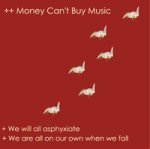
"We Will All Asphyxiate" might sound like a forboding title for a song, perhaps more appropriate for Slayer than for the new project of Ballboy's Gordon McIntyre, but of course in the end it's more thoughtful than bludgeoning, more the work of a dreamer song than a Satanist. With Ballboy McIntryre once spoke longingly of taking a trip to space. Here he's contemplating the planets, imagining the music that makes them move, thinking romantic thoughts about the connections between music and people and the stars. Meanwhile a somewhat computer-ish woman's voice reads off Johannes Kepler's laws about the planets, layering idea over idea, her voice over his, with a bed of synthesizers underneath. Layering is a big part of this Money Can't Buy Music endeavor, in the sense that in place of just rock n' roll instruments McIntryre's working with computers, looping things and playing around with how they fit together. The b-side on this two-song single, "We Are All On Our Own When We Fall", sounds less obviously computer-driven, as at its core is McIntryre with his guitar, singing a gentle, introspective song. It's much like Ballboy's album The Sash Your Father Wore and Other Stories, and just as good, demonstrating McIntryre's talent at writing intelligent, moving pop songs filled with tangible emotions any human being should recognize. Here the sounds listeners would think of as 'electronic' are more like background textures and embellishments, giving the song a slightly different aura. The Money Can't Buy Music project seems all about that, about messing around with different atmospheres and moods in which to set McIntryre's songs. It's off to a grand start. - dave heaton
Part 2, Live From The Breadline (Ninja Tune)
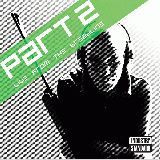
Part 2 is perhaps better known for being a producer for New Flesh and a highly regarded remixer who worked for a wide range of artists including Roots Manuva, Ty, Serge Gainsbourg, Trilok Gurtu, Wu-Tang's Killah Priest and Saul Williams. Apart from this, he is also a successful spraycan artist who exhibits regularly in the UK and Europe . With the album Live From The Breadline, Part 2 shows us that the stuff he is made of is talent. Featuring a fantastic line-up of vocalists including Fallacy, LSK, Sandra Melody (of "Diplo Rhythm" fame), Juice Aleem, Toastie Tailor and Lotek, the album is a dizzying pastiche of hip hop, lush electronics, dance rhythms, raw vocals, reggae/dub basslines and, above all, propulsive beats. In all the songs there is a special and playful interaction between vocals and beats, from the irresistible opening track 'Will It Ever', featuring Sandra Melody, and the dub of 'Rose Tinted Glasses', featuring LSK, Lotek and Tomo, to the funky and sensual 'Concrete Jungle' featuring LSK. This album shows how Part 2 uses Black British Music and reinvents is, writing unconventional tunes and radically restructuring the world of beats. Live From The Breadline is indeed a compendium of Part 2's skills, and it definitely confirms his calibre. - anna battista
Plains, Into Tone (Scarcelight)

How close to silence can music get and have it still be considered music? Plains' Into Tone, improvised live at the 2004 Version Festival starts off pretty close to silence, with just the faintest rumbling of a faraway storm. The storm never comes, though when the music unexpectedly gains in volume - that is, when distinct sounds appear - it does startle a bit, in the process adding a slight sense of doom to the otherwise serene, still work. Plains follow in Brian Eno's path, of creating a recording that when played will subtly affect the environment, even as it won't be grasped onto in the same sense that most music is. Field recordings, computers, guitar, electric bass, feedback, linuxCsound, and digital feedback were the instruments used for Into Tone, yet you'd be forgiven for thinking the music was created from air, water, and dust. - dave heaton
Popism: Pocket Radiodrops Volume Two (Creeping Bent)
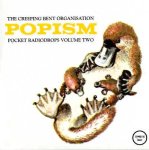
Don't want to sound like a fastidious critic, but there are occasional times when you feel like hating Franz Ferdinand since it looks like it was only thanks to them that the music press suddenly showed any interest in seminal bands such as Orange Juice, Josef K or Fire Engines. A toast to Creeping Bent then, the record label that always looked forward to the future of music, without forgetting the great heroes of the past. This compilation is the long awaited follow-up to the 2002 Nouvelle Vague anthology, and, like the latter, it contains some of the best music around. Opening with The Nectarine No.9's 'Hanging Around/Re-Model' and closing very aptly in a cyclical sort of way with Fire Engines' raw 'Discord', recorded live in 1980, the anthology features The Secret Goldfish, The Leopards, Gareth Sager, Vic Godard and Fake Eyelashes, but also a few surprises such as a cover of Orange Juice's 'Rip It Up' sung in Punjabi, courtesy of Future Pilot A.K.A.; Port Sulphur v. Colditz featuring Monica Queen on vocals, singing the nostalgic 'Towerblock'; King Creosote with the folk-pop 'Homeboy', and Article 58's 'Distortion', produced by Postcard's Alan Horne and Josef K's Malcolm Ross. Two highlights of the compilation are 'A Sad Past' by Say Jansfield, who make their debut release with this single, and the hypnotic 'Fiverounds' by Serf, and, if this were a fair world, these two bands would rule our lives. In Popism there's everything a genuine Creeping Bent fan would want from life: unique bands, great inspirations and a real love for excellent music. - anna battista
Sun Kil Moon, Tiny Cities (Caldo Verde)

Is it a worthwhile endeavor to take someone else's songs and make them sound exactly like your own? I never think it is when it's, for example, a punk band taking a Christmas song and making it sound like a by-the-numbers punk rock song. But Mark Kozelek turning rock songs into slow, melancholy acoustic-guitar songs is something else entirely. The difference is that he's not just dressing the songs in a new outfit, he's pulling out of the original song something that was there, but hidden. That was the case with his AC/DC covers, which somehow still contained and celebrated the swagger of the originals while revealing more pain. And it's the case with his new album of Modest Mouse covers, Sun Kil Moon's Tiny Cities. It's a disorienting album to hear for the first time. Not just the style and pace, but the melodies themselves have been altered, to sound completely different. Yet somehow it still feels familiar. Amazingly, the essence of Modest Mouse's songs Tiny Cities doesn't just remain, it shines. At their best Modest Mouse display a very grounded, unpretentious sort of philosophy, mixed in with history and autobiography. Big questions about life are conveyed in an almost ambivalent, and occasionally quite bitter, way, and there's a continuing theme of exploration and re-invention. All of this comes through in Sun Kil Moon's interpretations of songs from throughout the Modest Mouse catalogue, sometimes even more clearly than in the originals, due to Kozelek's stirring voice. In style the songs are still very much in the vein of Kozelek's body of work (with Red House Painters, Sun Kil Moon, and under his own name), but the more you listen the more they do resonate strongly with Isaac Brock's unique view of modern America. - dave heaton
Voxtrot, self-titled EP (Cult Hero)

Earlier this year Alistair Fitchett of Tangents described the welcome rise in great American pop bands this year, enthusiastically declaring the existence of an "East Coast pop renassiance", with bands like Pants Yell!, The Pathways, and the Consultants leading the way. He was right on the money, but don't let the "East Coast" part mislead you into ignoring the rest of the country. It'd be a shame to ignore the Hush Records bands in Portland, or Seattle's Math and Physics Club. And it's be a crying shame to overlook Austin, Texas's Voxtrot, certainly one of today's shooting stars. They haven't recorded a full-length album yet, but their 5-song self-titled EP is a truly splendid example of the fine art of songwriting. Voxtrot starts with the double whammy of "Raised By Wolves" and "The Start of Something". Both are snappy, uptempo singles with unforgettable hooks; the latter also has a Smiths-ish sensitive side that floats forward in the vocals. Those first two songs are the A-sides, in a way, as each has also appeared on a 7" backed by an entrancing ballad. But the other three songs on Voxtrot are just as memorable. Voxtrot somehow sounds like the '80s, the '90s, and the '00s at once, which ultimately means that they sound like none of those eras, more like a contemporary pop-rock band with its own knack for playing songs that listeners will remember, for their melodies but also their heart. - dave heaton
Copyright (c) 2005 erasing clouds |
|